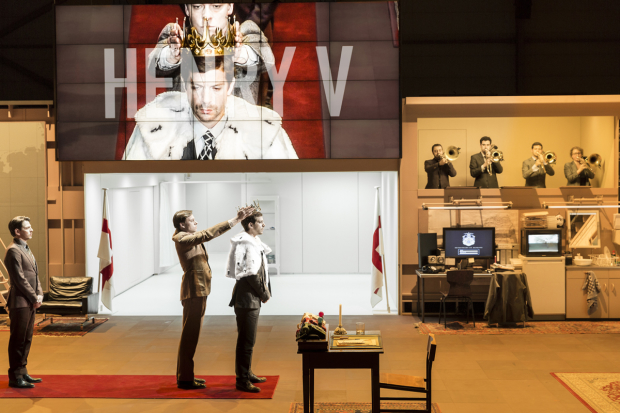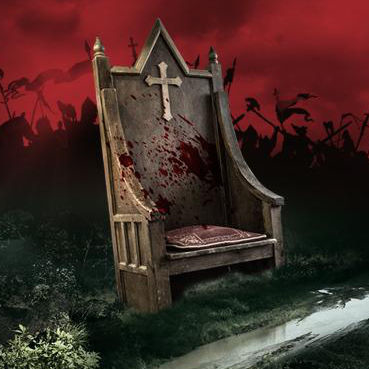Michael Coveney: Do Shakespeare marathons echo box set binges?

© Jan Versweyveld
And two weeks after Nunn's blockbuster, Chichester offers three early Chekhov plays – Platonov, Ivanov and The Seagull – all translated by David Hare, directed by Jonathan Kent, on one single Saturday. You can be sure these marathon days will be completely sold out. There's nothing we like more than a theatrical escape into history as it overrules the present, readjusts our brain cells and makes of its audience a coordinated band of brave and dedicated adventurers. Death to the short precious play, and the tyranny of the "no interval" brigade!
In November, the RSC will launch at the Barbican its new Henry V, followed by the double of Henry IV Parts 1 and 2 from last season (Antony Sher as Falstaff) and completes the tetralogy with the return of David Tennant as Richard II, all four plays given in repertory, and four cycles (over three days each) in January. Tickets are already selling like hot cakes as Bardophiles gird their loins and stuff their cod-pieces with nutritious sustenance. Although the plays are historic prequels to the Wars of the Roses, Londoners in Kingston and the City thus have a rare chance to see the complete cycle of the greatest history plays in the language in the order in which they were written. Well, almost complete.

John Barton, who co-directed the original Wars of the Roses (yes folks, I saw the complete cycle, mostly standing at the back of the stalls in Stratford-upon-Avon, having queued at dawn for the box office to open at 10am) with Peter Hall and Clifford Williams, messed around with Henry VI and invented a new play, Edward IV, thinking Henry VI had too many duff and dull patches. He was proved wrong about that by his own company when Terry Hands did the complete Henry VI plays in 1977, and then again when Michael Boyd repeated the trilogy in 2000.
Last week I travelled to Amsterdam to see Ivo van Hove's four-hour compression of Henry V, Henry VI and Richard III. Feeling slightly short-changed, I then took a train to Paris and headed off to Rouen in Normandy to see 32 year-old Thomas Jolly's company, La Piccola Familia, perform all three Henry VI plays, virtually uncut, with very long intervals, starting at 10am on Saturday morning and ending with Jolly himself delivering the opening soliloquy of Richard III in a tight T-shirt and an Elizabethan ruff – he'll complete the role in Rennes in October and in Paris in January – at 3.30am on Sunday.
The van Hove Kings of War, co-produced by the Barbican and van Hove's Toneelgroep, Amsterdam, follows the RSC into the Barbican next April, and couldn't be more different if it tried from anything the RSC ever does with these plays. It's great, and very exciting, but it's not, mostly, Shakespeare, not even Shakespeare in double Dutch. The Jolly trilogy, in contrast, while being a brilliantly eclectic and outrageous production (Jolly as Young Talbot dies to the accompaniment of Dido's Lament by Purcell and Jack Cade, a punk in a topper, rabble-rouses with Gary Glitter's invitation to be in "my gang") is seriously committed to the language in an accurate new French translation.
Just as people sit down for a weekend with a complete box set of The Sopranos, or The West Wing, or Breaking Bad, or The Killing, or head off for an immersive rock festival weekend at Glastonbury (coming up right now) or Reading, or Latitude, several of us at WOS are preparing for the plunge into the maelstrom of the Edinburgh Fringe and International Festivals in early August. You enter a bubble, a parallel universe, an alternative lifestyle. You shed responsibility to all but the art on offer, your tightly planned schedule, your comrades in arms and beer tents.
'The feeling of having made an effort to be there in the first place was all part of the experience'
The Rouen adventure reminded me of so many marvellous marathons, all of them reinforcing the idea of being alive in a suspended cocoon of pleasure and participation with actors and fellow audience members alike: the first complete 22-hour cycle of Ken Campbell and Neil Oram's The Warp, a sort of acid Archers, when I entered the ICA at 10am one January morning in 1979 and emerging at 8am the next, without having missed a single word, freak-out or genital exposure (Campbell's warm-up sci-fi show, Illuminatus!, which opened the NT's Cottesloe auditorium in shortened form, with the voice of John Gielgud as a computer, had lasted a mere 12 hours in Liverpool); Peter Brook's nine-hour 1985 Mahabharata in the Glasgow Tramshed (though it had premiered in an outdoor quarry in France); three complete Oresteias in the 1980s by Peter Hall, Peter Stein and Andrzej Wajda; the David Hare trilogy day (Racing Demon, Murmuring Judges, The Absence of War) at the NT in 1993.
In Rouen, as in Amsterdam, the feeling of having made an effort to be there in the first place was all part of the experience. It was a predominantly young and curious audience. Jolly was returning to home base in triumph from last year's Avignon Festival. Even Joan of Arc, burned at the stake by the English in Rouen in Henry VI Part One (I sunk a little lower into my seat in this scene) had come home to die. We spilled out through the bars of the packed 1300-seater Théâtre des Arts, the local opera house, too, and into the big square outside, dotted with pop-up stalls selling crêpes, seafood and sandwiches. I extended my mini-break by having lunch in Paris before boarding the Eurostar.
It seemed somehow disappointing to roll up to Hampstead Theatre on Monday night to see (yet another) earnest play about child abuse… theatre had seemed larger, more extravagant and exciting for a while, and may seem so again by the time the flags are raised in Kingston in October.










